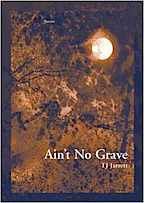
Book Review: Ain’t No Grave by TJ Jarrett

Ain’t No Grave
Poems by TJ Jarrett
New Issues Poetry & Prose, September 2013
ISBN-13: 978-1936970186
$15; 92pp.
Reviewed by Beth Sutton-Ramspeck and Doug Ramspeck
In The Souls of Black Folk (1903), W.E.B. Du Bois famously writes:
It is a peculiar sensation, this double-consciousness, this sense of always looking at one’s self through the eyes of others, of measuring one’s soul by the tape of a world that looks on in amused contempt and pity. One ever feels his two-ness,—an American, a Negro; two souls, two thoughts, two unreconciled strivings; two warring ideals in one dark body, whose dogged strength alone keeps it from being torn asunder.
This supple theory helps illuminate TJ Jarrett’s excellent debut collection of poems, not only because the book deals often with matters of racial identity and discrimination—it does—but because it explores “doubleness” in general. The poems, indeed, seem to exist often in liminal states, in that place where, as a postmodernist might describe it, the binaries break down. The book is split into five sections (How to Speak to the Dead, What We Call Tears, The Opened Door, Body and Body, and The Light They Made), and death is one of its central preoccupations. Often the speakers attempt—usually in vain—to navigate between life and death, to tell one from the other. This plaintive search to find one’s bearings seems at the core of many of these moving poems, and creates for the book as a whole a strange urgency.
“The Dead” range from Lazarus to the victims—named in the dedications to several poems—of early twentieth-century rapes and lynchings, to the speaker’s Aunt Ethel, a recurring character in many of the poems in The Light They Made section. That “Light,” in fact, exists as counterpoint to another recurring liminal “character” in the collection, “the Dark.”
In “What the Dark Says,” Jarrett writes,
No body exists
separately in the dark—
one bleeds
……….right into the other.
Once a hand touches long enough to name it,
that hand can lay
claim.
Dark, and a culture of racial violence, attempt to “name” and “define,” but “You can take / your name with you in the dark.” Significantly, these poems subvert our usual notions of doubling, and in doing so create moving human stories.

Like the continue one, Donald, you’ve nailed that once more. Consequently intriguing!
Great. Thanks!
Cool site! I am impressed!